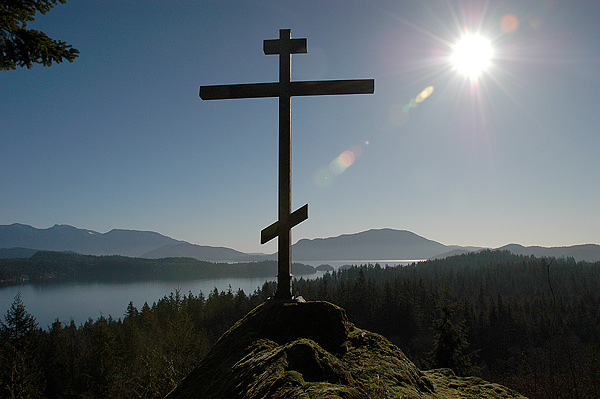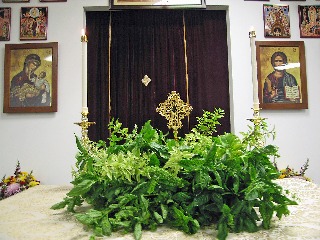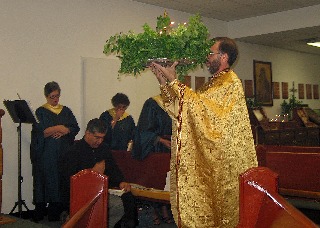
Shine, Cross of the Lord, shine with the light of thy grace upon the hearts of those that honor thee.
This Sunday marks the third Sunday of Lent. On this Sunday Orthodox Christians celebrate the adoration of the precious and life giving Cross. At the end of the Divine Liturgy the priest processes around the church carrying a tray with a cross surrounded by basil leaves or flowers while hymns about the Cross are sung.
Hail! life-giving Cross, unconquerable trophy of the true faith, door to Paradise, succour of the faithful, rampart set about the Church. Through thee the curse is utterly destroyed, the power of death is swallowed up, and we are raised from earth to heaven: invincible weapon, adversary of demons, glory of martyrs, true ornament of holy monks, haven of salvation bestowing on the world great mercy.
Come, Adam and Eve, our first father and mother, who fell from the choir on high through the envy of the murderer of man, when of old with bitter pleasure ye tasted from the tree in Paradise. See, the Tree of the Cross, revered by all, draws near! Run with haste and embrace it joyfully, and cry to it with faith: O precious Cross, thou art our succour; partaking of thy fruit, we have gained incorrpution; we are restored once more to Eden, and we have received great mercy.
The Old Testament Fulfilled
Many of the hymns of the Orthodox Church services consist of biblical exegesis. In the Matins service for this Sunday we hear how Old Testament foreshadowed the Cross of Christ and how the Cross fulfilled the Old Testament prophecies and types.
The Way Back to the Garden of Eden
We learn in the following kontakion (hymn) how the Cross dealt with the fiery sword that blocked access to Paradise (Genesis 3:24).
The fiery sword no longer guards the gate of Eden, for in a strange and glorious way the wood of the Cross has quenched its flames. The sting of death and the victory of hell are now destroyed, for Thou art come my Saviour, crying unto those in hell: ‘Return again to Paradise.’
Jacob the Patriarch
Jacob as he was dying leaned on the top of his staff and venerated Christ (Genesis 47:31, Hebrews 11:21).
Jacob prefigured Thy Cross in days of old, O Christ, when he venerated the top of Joseph’s holy staff, in which he saw foreshadowed the dread sceptre of Thy Kingdom; and now we venerate Thy Cross in faith for ever.
Moses the Lawgiver
Moses stretching out his arms was a type of the Cross (Exodus 17:8-12).
When now we venerate Thy Cross, which Moses once prefigured with his outstretched arms, we put to flight the invisible Amalek, O Christ our Master, and so we gain salvation.
Elisha the Prophet
What looks like a strange incident of the missing ax head and Elisha throwing a stick of wood into the Jordan River is interpreted as a foreshadowing of the Cross of Christ and our redemption (4 [2] Kings 6:5-7).
Come, Elisha the prophet, and tell us plainly: What was the wood that thou hast cast into the water? ‘It was the Cross of Christ, which draws us up from the depths of corruption: and we venerate it with faith for ever.’
The Trees Shall Rejoice
The Orthodox Church reads the Psalms through Christ-centered glasses, that is, looking for its fulfillment in Christ. Thus instead of reading the verse about the trees of the forest rejoicing literally (Psalm 95 [96]:12), the Church reads it allegorically.
Let all the trees of the forest dance and sing, as they behold their fellow-tree the Cross, today receiving veneration: for Christ, as holy David prophesied, has exalted it on high.
Chanting Versus Preaching?
In a recent FaceBook thread a reader who grew up in the Greek Orthodox Church asked why there was so much chanting in the church and so little preaching from the Bible. Many of the responses were that much of the hymns and prayers were Scriptural in content.
However, I think the reader did raise a valid point. I think she felt the need for didactic Bible preaching in the Orthodox Church. All too often it seems that after the Gospels are read, the priest will turn around, face the altar and move into the remaining part of the Liturgy. Or that the homily that follows is so brief as to barely scratch the surface of the Bible passage. What is sorely needed are sermons/homilies that explain to the congregation the meaning the biblical passage read that morning and an exhortation to live out that Bible passage in the context of the Church.
As a Protestant Evangelical I was encouraged to read and study the Bible. When I became Orthodox I found this biblical training very helpful. Knowing the Bible passages helped me to better understand what was being sung or chanted in the service. The value I find in the hymns and chants of the Church is that hearing theology in song penetrates my mind and heart on a deeper level than pure didactic sermons. So my answer to those who wonder about chants versus sermons is: “We need both. Strong biblical preaching to the mind will complement and revitalize the chants and hymns sung from the heart.” One of Orthodoxy’s greatest bible expositors, John Chrysostom, was also responsible for the Liturgy used on most Sundays in Orthodox churches.
Robert Arakaki
Reference
The Lenten Triodion. By Mother Mary and Metropolitan (Archimandrite) Kallistos Ware. South Canaan, Pennsylvania: St. Tikhon’s Seminary Press. [pp. 334-352]


When the Church embraces the doctrines of demons as all jurisdictions of the Orthodox Church in America have done, (I only know of one priest who hasn’t compromised), then what can you expect from the priests? Your concerns and complaints are legitimate and reveal a dying body and the only cure is repentance, fleeing from the devil and living a life of no compromise, no matter what the cost. Without courageous priests who are willing to take up their cross and follow after Christ, the Church in America will shrivel up and die.
Gary,
Please refrain from making sweeping condemnations of Orthodoxy in America or elsewhere. Constructive criticism is needed but not sweeping statements like the ones you just made. Especially during the season of Lent Orthodox Christians should strive to refrain from making critical remarks.
Let us keep in mind the prayer of St. Ephraim the Syrian:
O Lord and Master of my life,
a spirit of idleness, curiosity, ambition, and idle talk give me not.
But a spirit of chastity, humility, patience, and love,
bestow upon me Thy servant.
Yea, O Lord King, grant me to see mine own failings
and not to condemn my brother;
for blessed art Thou unto the ages of ages. Amen.
A FRIGHTFUL TIME
“Not long before antichrist is enthroned, even those churches that have been closed will be repaired and restored — not only their exteriors, but their interiors, as well. They will gild the cupolas of bell-towers and cathedrals, alike; and when they have completed the main one, then will the time have come for antichrist to be enthroned. Pray that the Lord might lengthen that time, that we might be encouraged and sustained; it is a frightful time that awaits us. The restoration of the cathedrals will continue up to the very moment that antichrist is crowned. We will have unprecedented splendour,” Starets Lavrentii would say.
“Do you see how craftily and insidiously all this is being prepared?” Batiushka would continue, tearfully. “All the cathedrals will be exceedingly splendid, as never before, but you must not attend these cathedrals, for the Bloodless Sacrifice of Jesus Christ will not be offered there. Remember, there will be churches, but Orthodox Christians must not attend them, as the entire ‘synagogue of Satan’ (Apoc. 2.9) will be gathered there! I repeat yet again that one must not attend those cathedrals; there will be no grace in them!”
http://www.pigizois.net/agglika/starets/01.htm
Amen Robert! The language of the Services and Liturgies are indeed
instructive of the heart…but more so when we know the Scriptures.
Let us (especially us converts relatively new to Orthodoxy) humbly
pray and learn in humility before the Holy Cross of Christ. Let us
scorn and abjure all critical spirits that haunt us to severe judgments
and which stroke our pride. Lord have mercy. Lord have mercy. Lord
have mercy.
Thanks David. And Gary wrote a nice apology. Let us persevere in this Lenten journey to Holy Week and then to Pascha.
Robert